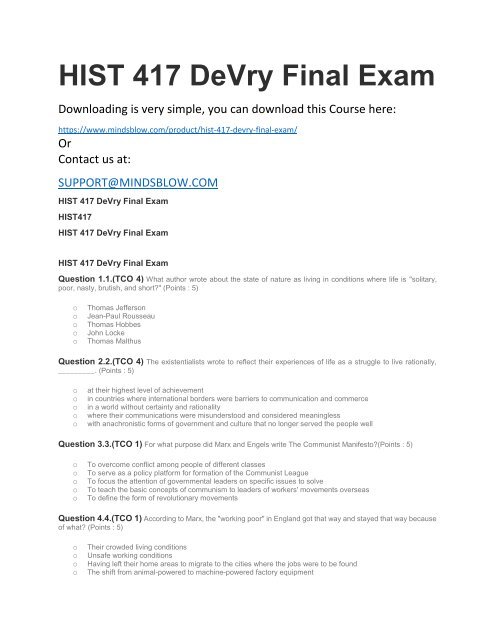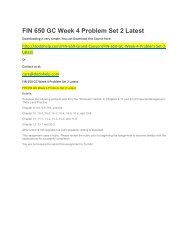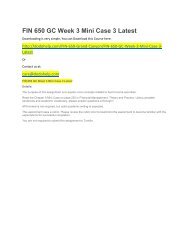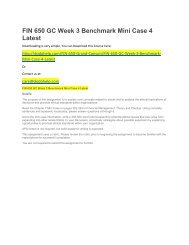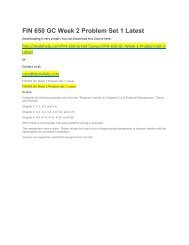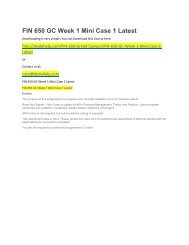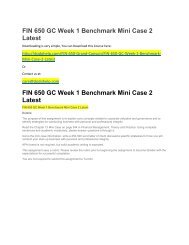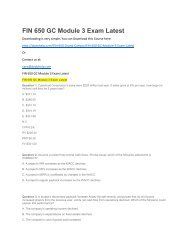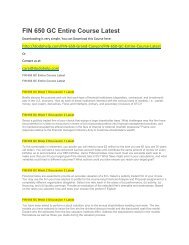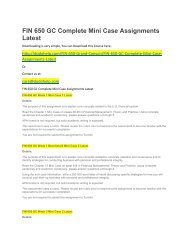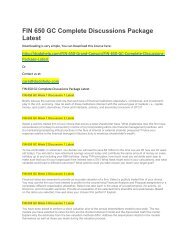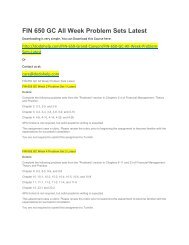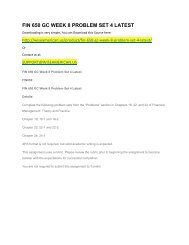HIST 417 DeVry Final Exam
You also want an ePaper? Increase the reach of your titles
YUMPU automatically turns print PDFs into web optimized ePapers that Google loves.
<strong>HIST</strong> <strong>417</strong> <strong>DeVry</strong> <strong>Final</strong> <strong>Exam</strong><br />
Downloading is very simple, you can download this Course here:<br />
https://www.mindsblow.com/product/hist-<strong>417</strong>-devry-final-exam/<br />
Or<br />
Contact us at:<br />
SUPPORT@MINDSBLOW.COM<br />
<strong>HIST</strong> <strong>417</strong> <strong>DeVry</strong> <strong>Final</strong> <strong>Exam</strong><br />
<strong>HIST</strong><strong>417</strong><br />
<strong>HIST</strong> <strong>417</strong> <strong>DeVry</strong> <strong>Final</strong> <strong>Exam</strong><br />
<strong>HIST</strong> <strong>417</strong> <strong>DeVry</strong> <strong>Final</strong> <strong>Exam</strong><br />
Question 1.1.(TCO 4) What author wrote about the state of nature as living in conditions where life is "solitary,<br />
poor, nasty, brutish, and short?" (Points : 5)<br />
o<br />
o<br />
o<br />
o<br />
o<br />
Thomas Jefferson<br />
Jean-Paul Rousseau<br />
Thomas Hobbes<br />
John Locke<br />
Thomas Malthus<br />
Question 2.2.(TCO 4) The existentialists wrote to reflect their experiences of life as a struggle to live rationally,<br />
_________. (Points : 5)<br />
o<br />
o<br />
o<br />
o<br />
o<br />
at their highest level of achievement<br />
in countries where international borders were barriers to communication and commerce<br />
in a world without certainty and rationality<br />
where their communications were misunderstood and considered meaningless<br />
with anachronistic forms of government and culture that no longer served the people well<br />
Question 3.3.(TCO 1) For what purpose did Marx and Engels write The Communist Manifesto?(Points : 5)<br />
o<br />
o<br />
o<br />
o<br />
o<br />
To overcome conflict among people of different classes<br />
To serve as a policy platform for formation of the Communist League<br />
To focus the attention of governmental leaders on specific issues to solve<br />
To teach the basic concepts of communism to leaders of workers' movements overseas<br />
To define the form of revolutionary movements<br />
Question 4.4.(TCO 1) According to Marx, the "working poor" in England got that way and stayed that way because<br />
of what? (Points : 5)<br />
o<br />
o<br />
o<br />
o<br />
Their crowded living conditions<br />
Unsafe working conditions<br />
Having left their home areas to migrate to the cities where the jobs were to be found<br />
The shift from animal-powered to machine-powered factory equipment
o<br />
Their dependence on the "means of production"<br />
Question 5.5.(TCOs 9 & 10) Technology has had an impact on our culture, community, and family. The first public<br />
wireless electronic transmitted media occurred: (Points : 5)<br />
o<br />
o<br />
o<br />
o<br />
o<br />
when black and white photos of WWII were transmitted.<br />
as the broadcast of a football game.<br />
on Christmas in 1906 and included the song, O Holy Night.<br />
with the transmission of overseas photos of a reporter.<br />
as the transmission of a radio talk show.<br />
Question 6.6.(TCO 2) President Woodrow Wilson's trip to France for the Treaty of Versailles negotiations was<br />
occasioned by what event? (Points : 5)<br />
o<br />
o<br />
o<br />
o<br />
o<br />
His election to a second term as President of the United States<br />
The United States refusal to enter into the World War<br />
Increasing military strength of the United States at the beginning of the 20th century<br />
Defeat of Germany in "The Great War"<br />
Increasing cooperation with the British Government<br />
Question 7.7.(TCO 2) What was the situation in which Adolf Hitler wrote Mein Kampf?(Points : 5)<br />
o He wrote from prison in 1923.<br />
o His diary from the World War I battlefields<br />
o His memoires before Berlin fell at the end of World War II<br />
o He wrote as he was being elected to the Reichstag in 1933.<br />
o He wrote for delivery as a speech to a rally.<br />
Question 8.8.(TCO 3) Sir Winston Churchill's speech where he coined the term "Iron Curtain" was delivered<br />
where?(Points : 5)<br />
o<br />
o<br />
o<br />
o<br />
o<br />
Joint session of Congress<br />
Westminster College, Fulton, Missouri<br />
The United Nations<br />
The House of Commons<br />
Broadcast to the British people on BBC Radio<br />
Question 9.9.(TCO 4) John Stuart Mill believed that in the absence of a written social contract, what does everyone<br />
who receives the benefit of protection of society owe? (Points : 5)<br />
o<br />
o<br />
o<br />
o<br />
o<br />
The fair share of taxes to pay for the operation of government<br />
To observe a certain line of conduct toward the rest of the society<br />
To acknowledge the sovereignty of the monarch<br />
To participate fully in the counsels of government<br />
To pay all one's debts<br />
Question 10.10.(TCO 3) Samuel Huntington wrote of major shifts in the way conflict would be waged after the end<br />
of the Cold War that global conflict would arise among what other entities? (Points : 5)<br />
o<br />
o<br />
o<br />
o<br />
o<br />
Eight races<br />
Eight civilizations<br />
Eight groups of migrating populations<br />
Eight holders of the major national resources<br />
Eight leading countries<br />
Question 11.11.(TCOs 5) Pragmatism as applied to the justice system is intended to produce what? (Points : 5)
o<br />
o<br />
o<br />
o<br />
o<br />
Consistent and reliable patterns of decision for some people<br />
An accumulation of applied justice called precedents<br />
Decisions based on probable and desired outcomes<br />
Greater understanding of the social justice needs of society<br />
Standard and accepted examples of activist jurisprudence<br />
Question 12.12.(TCO 8) Sigmund Freud worked with two assumptions in his attempts to analyze behaviors that<br />
could be explained by the existing psychologies of the day. One assumption was about the nature of memory. What<br />
was that assumption? (Points : 5)<br />
o<br />
o<br />
o<br />
o<br />
o<br />
Memories are made in the moment, and there are many variations in them.<br />
All memory is interpreted information and loses accuracy with every activity of remembering.<br />
Memories are contained in stories and are best told by retelling stories.<br />
Memories continue in patients even when they are unaware of the memories.<br />
Some memories are lost beyond recovery.<br />
Question 13.13.(TCO 3) According to the United Nations Charter, what principle governs the organization of the<br />
UN? (Points : 5)<br />
o<br />
o<br />
o<br />
o<br />
o<br />
The equal sovereignty of all members.<br />
The inherent personal rights of all free peoples.<br />
The equal sharing of the financial burdens of a worldwide collective security agreement.<br />
An assumption of the good will of all member nations.<br />
Freedom of travel for all diplomats for consultation.<br />
Question 14.14.(TCO 6) Which of the following are some of the characteristics of liberal theology? (Points : 5)<br />
o<br />
o<br />
o<br />
o<br />
o<br />
Return to objectivity and written scripture.<br />
Emphasize personal experience of God.<br />
Prevent church leadership by women.<br />
Applied scripture to social situations in a situation called neo-orthodoxy.<br />
Return to the authority of written scripture.<br />
Question 15.15.(TCO 7) Charles Darwin’s ideas about evolution were formed when he found that variation in<br />
species was worked out in two aspects: survival of individual lives in competition with others of the same species and<br />
(Points : 5)<br />
o<br />
o<br />
o<br />
o<br />
o<br />
increased changes in competition between species.<br />
increased competition between species.<br />
survival of individual lives against the environment.<br />
survival of a species compared to individual lives of different species.<br />
survival of individual lives in competition with different species.<br />
Question 16.16.(TCO 8) While Marx believed that people’s thoughts reflected the interests of the ruling class,<br />
Freud believed that people’s thoughts reflected (Points : 5)<br />
o<br />
o<br />
o<br />
o<br />
o<br />
neurological disorders from childhood.<br />
physiological disorders from childhood.<br />
conscious analysis of the news of the day.<br />
hidden forces or unconscious impulses.<br />
shared or collective unconscious beliefs.<br />
Question 1.1.( TCOs 6, 9, 10) In Seattle, WA in 1999, there were massive protests (often referred to as the Battle<br />
in Seattle) such as demonstrations, marches, and acts of civil disobedience by various groups (40,000 people) who felt<br />
disenfranchised (deprived of power) by decisions made by the International Monetary Fund (IMF) and the World Trade<br />
Organization (WTO). Various groups of these individuals formed and organized via the use of the internet and cell
phones. While some groups of anarchists engaged in violence, most of the individuals involved focused on peaceful<br />
protests. Mainstream media reported on these protests daily.<br />
In an essay written with forethought and precision, provide a postmodern analysis of these peaceful protesters, focusing<br />
on the role of the internet in the protesters’ ability to communicate, broadcast news about important events, organize<br />
their protest participation, and to educate people about the abuses of power made by the WTO and the IMF. (Points :<br />
40)<br />
Question 2.2.(TCOs 1, 2, 4, 5, 7, 8) Hope and despair are powerful motivators for change, and they are easily<br />
adapted by those who would become leaders for their own purposes. Some of those leaders adopt a Darwinian style<br />
of evolutionary thinking about the survival and success of their special populations of concern. Think about mobilizing<br />
people in calls for leadership articulating a vision for the future.<br />
In an essay written with forethought and precision, analyze the role of the liberation theologians in Latin America in this<br />
context, with a clear expectation of what achievements were envisioned and what the world would look like under that<br />
style of leadership. (Points : 40)<br />
Question 3.3.(TCOs 3, 6, 7, 8) Existentialism was an important philosophy of the Modern Era. In an essay written<br />
with forethought and precision, explain how the Sartre’s existentialism was an appropriate philosophy for the post WWII<br />
Cold War and the existential threat of the nuclear arms race.(Points : 40)


